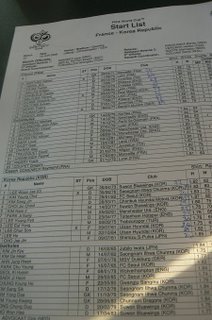Korean Soccer
Asia should be thankful for Australia – though Japan may find it difficult to find any gratitude – and the fact that the newest member of the Asian Football Confederation (AFC) was the only one of the five representatives to progress past the knockout stage.
Suspicions in Europe and elsewhere that Japan and South Korea’s 2002 success was helped hugely by home advantage will not have been allayed by the fact that the traditional big four Asian nations, were, as the saying goes, “home before the postcards”.
More serious is the fact that even with Australia’s presence in the last sixteen, there is sure to be at least some pressure from other confederations to reduce Asia’s current World Cup allocation of 4.5 spots. Any decision to do so would be have a profound effect on the continent’s football scene and with Australia looking strong, one or more of the traditional powers will miss out in 2010.
It is natural that there will be postmortems as to why Asia’s traditional ‘big four’ didn’t make it to the second round and earlier this week, the AFC’s President, Mohamed bin Hamman, pointed the finger at the standard of the continent’s domestic leagues.
It doesn’t take a genius to recognize that Asian domestic leagues have to improve and not just for the sake of future World Cups. However, nobody should forget that European nations have long and rich football traditions and it is only relatively recently that leagues such as Korea’s and Japan’s became professional – Korea was the first in 1983.
Asian fans shouldn’t then beat themselves up about the standard of their domestic set-ups, it would be truly miraculous if their leagues could even be compared to those of even average European nations and it is a credit to Japan that, in terms of professionalism and organization at least, the J-League can.
The problem is that during the World Cup, they are compared with the best by people watching all over the world simply because that is the nature of the tournament. Sat in Leipzig’s Stadium before the Korea – France clash, a quick glance at FIFA’s team sheets revealed the size of the challenge facing the 2002 semi-finalists. Players from Seongnam Ilhwa Chunma, Jeonbuk Hyundai Motors and Suwon Samsung Bluewings were facing those from Real Madrid, Chelsea, Juventus and Bayern Munich -it is to Korea’s credit that they came away with a 1-1 draw.
Bin Hamman said that Australia succeeded because their players play in big leagues but what he is forgetting is that those leagues are not Australian. He can’t have it both ways – praising a nation who fielded just one or two A-League stars in the World Cup while telling others to improve their domestic set-ups. International experience is good for players and national teams but a strong league provides a much stronger foundation for continued success.
It is tough to find a balance. Immediately after Korea’s loss against Switzerland, Dick Advocaat told his soon-to-be-ex employers that the K-League has to improve. At the same time in a different part of Hanover’s World Cup Stadium, Lee Chun-soo, perhaps Korea’s best player in Germany and the 2005 K-League MVP, was telling reporters that he wanted another try in Europe.
Just days after giving his advice, Advocaat is getting ready to take two of the K-League’s best players, Kim Dong-jin and Lee Ho, with him to his new club Zenit St. Petersburg. It is a little like going to a friend’s party, telling them it’s boring before taking some of the best music and drinks to another party. The experience in Russia may improve the players and therefore the national team but what about the K-League?
It is hard to blame the players especially as they are usually encouraged to head overseas by media and supporters who are proud to see their home-grown stars strutting their stuff on a weekly basis in such strong leagues England, Spain or Germany.
France’s second division couldn’t be classed as such though that is where one of Asia’s brightest stars Masashi Oguro chose to play – a decision that shows there is still much work to be done.
The striker was one of the successes of the 2005 J-League season and his goals helped Gamba Osaka lift a first-ever league title. He broke into the national team and helped Team Nippon qualify for the World Cup. Instead of staying with Gamba, one of the biggest and best teams in Asia, to defend their title as well as participate in the Asian Champions League, he instead chose to join mid-table French second division team Grenoble Foot38 with an average attendance of only 5,000 ..
While it is welcomed that there seems to be a renewed realization that matters need to improve, it will take time, patience and a good deal of administrative will. Attention shouldn’t be overly fixed on the World Cup, a target of competitive domestic leagues is not a means to an end but an end in itself and the AFC, the respective domestic organizations, the media and the fans must be in it for the long haul.
If that happens then, despite the disappointment of the past month, there is a glimmer of hope that the 2006 World Cup may eventually seen as a watershed in Asian football.
K-League Articles
Kashima Antlers and Seoul FC Join Soccer 7s
Seoul Set for K-League Success
Ulsan 1 Monterrey 3 Club World Cup
Copyright (c) John Duerden & Soccerphile.com


